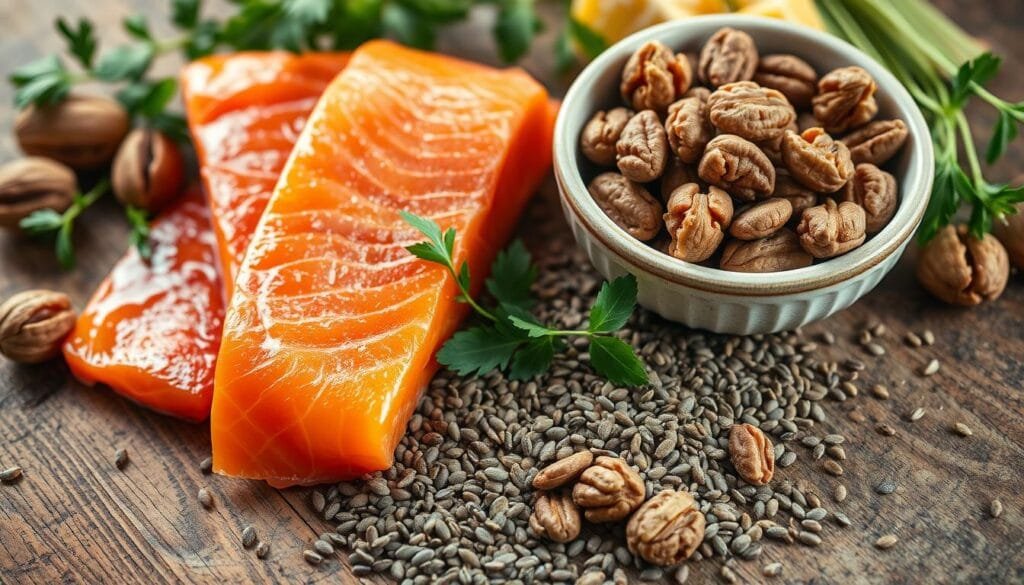Studies show that people who live healthy lives tend to live longer and feel better. By adding simple daily wellness practices to your day, you can boost your energy levels, improve your thinking, and work better. This article will share 10 healthy habits to help your mental health and well-being. They also support your heart health and help keep your body at a healthy weight.
Eat a Balanced, Nutrient-Rich Diet
Eating a diet full of nutrients is key to staying healthy and full of energy. Make sure to include whole, unprocessed foods like fruits, vegetables, whole grains, lean proteins, and healthy fats. These foods give your body the nutrients it needs to work well.
Studies show that using a smaller plate can make you feel fuller and eat less. Also, eating vegetables before a meal with carbs helps control blood sugar. It slows down how carbs are absorbed.
Practicing mindful eating is important. This means eating slowly and listening to your body’s hunger and fullness signals. Fast eaters tend to eat more and have a higher BMI than slow eaters.
Cooking at home often is linked to a lower risk of obesity and better diet quality, even in kids. Adding high-protein meals can also help control hunger. It lowers the hunger hormone, ghrelin.
By choosing a nutrient-rich diet, you support your health and prevent chronic diseases. You’ll also keep your energy levels stable all day.
Stay Hydrated by Drinking Plenty of Water

Proper hydration is key for your health. Water is a big part of our bodies, making up to 60% of it. It helps keep our body temperature right, aids digestion, and carries nutrients.
Adults should drink about 8 glasses of water a day, or 64 ounces. But, your needs can change based on your weight, how active you are, and your health. For example, if you’re more active or sick, you might need more water.
Getting a nice water bottle can remind you to drink more. You can also set reminders on your phone. Drinking water before meals can help with digestion and might help you lose weight.
It’s very important to stay hydrated, but some people are more at risk. Kids, older adults, and those with chronic illnesses need to drink more water. Severe dehydration can cause serious problems, like kidney damage, and may need doctor help.
Drinking water isn’t the only way to stay hydrated. Food like fruits and veggies also counts for 20% of our daily water. Choosing sparkling water over sugary drinks can also help you drink more water and eat less sugar.
By focusing on hydration and using simple tips, you can keep your body healthy. This ensures you get the most out of drinking water every day.
Incorporate Regular Exercise into Your Routine
Doing Regular Exercise is key for staying healthy and feeling good. It boosts brain function, helps with weight, and strengthens your heart and muscles. Find activities you love, like walking, cycling, swimming, or dancing, to keep you active and healthy.
Adults should aim for 150 minutes of moderate activity weekly. This can be 30 minutes, five times a week. Even short, intense workouts can be as good as longer ones. It’s important to pick the right intensity, so you can talk or not, depending on how hard you’re working.
Make exercise a habit by setting triggers, like a certain time or activity. Reward yourself after working out to stay motivated. This helps keep you on track.
Start with exercises that fit your life and preferences. This makes it easier to stick with it. Adding strength training and stretches can also prevent injuries.
The Benefits of Regular Exercise
- Improved cardiovascular health
- Enhanced mobility and joint health
- Increased muscle and bone strength
- Better mood and energy levels
- Improved sleep quality
- Effective weight management
Adding Regular Exercise to your day can greatly improve your health. Listen to your body, set achievable goals, and exercise with friends to stay motivated.
| Exercise Type | Intensity Level | Conversational Ability |
|---|---|---|
| Low-Intensity | Can talk in full sentences or sing | Can easily carry on a conversation |
| Moderate-Intensity | Can speak in full sentences but not sing | Can have a conversation but with some difficulty |
| Vigorous-Intensity | Unable to talk in full sentences due to breathlessness | Cannot have a conversation |
Protect Your Skin from Sun Exposure
Keeping your skin safe from the sun’s harmful rays is key to your health. Sun exposure can cause early aging, wrinkles, and age spots. It can also lead to skin cancer, the most common cancer in the U.S.
Use a broad-spectrum sunscreen with SPF 15 or higher every day. Even on cloudy days, it’s important. For better protection, pick a sunscreen with SPF 30 or more. Reapply every two hours, or more if you’re swimming or sweating.
Wearing protective clothes like long sleeves and hats can help too. Staying in the shade between 10 a.m. and 4 p.m. also reduces your UV exposure.
Eating well, managing stress, and sleeping enough can also help your skin. By protecting your skin, you can lower your risk of skin cancer. You’ll also keep your skin looking young and healthy for longer.
| Skin Protection Measure | Effectiveness |
|---|---|
| Broad-spectrum sunscreen with SPF 30 or higher | Blocks approximately 97% of UVB rays |
| Protective clothing (long-sleeved shirts, long pants, wide-brimmed hats) | Provides additional physical barrier against UV exposure |
| Seeking shade during peak sun hours (10 a.m. – 4 p.m.) | Reduces direct exposure to the sun’s strongest rays |
| Maintaining a healthy, balanced lifestyle | Supports overall skin health and resilience |
“Protecting your skin from the sun is one of the most important things you can do to keep it healthy and youthful.”
By following these sun protection tips, you can enjoy the outdoors safely. Remember, sunscreen is your best defense against the sun’s harmful rays.
Prioritize Quality Sleep

Getting quality sleep is key to your health. Try to sleep 7-9 hours each night. This lets your body and mind rest and get ready for the next day. Quality sleep helps with healing, remembering things, keeping your immune system strong, and controlling your mood.
But, many people don’t get enough good sleep. Not enough sleep can cause problems like memory loss, heart issues, weight gain, and bad blood sugar levels.
Establish Healthy Sleep Habits
To get the quality sleep you need, try these tips:
- Stick to a regular sleep schedule every day, including weekends. This helps your body’s clock stay in sync.
- Make a calm bedtime routine, like reading or gentle stretching. It tells your brain it’s time to sleep.
- Make your bedroom cool, dark, and quiet. This helps you sleep better.
- Don’t use screens or blue light before bed. It can mess up your sleep cycle.
- Stay away from caffeine, alcohol, and big meals before bed. They can hurt your sleep quality.
By focusing on sleep, you can get healthier and feel better. Remember, good sleep is a smart choice for your future health and strength.
| Sleep Recommendation | Age Group | Hours of Sleep |
|---|---|---|
| School-age Children | 6-13 years | At least 9 hours |
| Teenagers | 14-17 years | 8-10 hours |
| Adults | 18-64 years | 7 hours or more |
| Older Adults | 65+ years | 7 hours or more |
Incorporate Strength Training and Flexibility Exercises

As you get older, it’s key to focus on strength training and flexibility exercises. These help keep you healthy and active. Strength training builds muscle and supports strong bones. Flexibility exercises, like stretching, keep your joints moving well.
The Department of Health and Human Services suggests doing strength training exercises for major muscles twice a week. You can lift weights, use resistance bands, or try yoga. Do one set of each exercise, using enough weight to make your muscles tired after 12-15 reps.
Flexibility exercises, like stretching, yoga, tai chi, and pilates, are also vital. They improve joint movement and posture, reducing injury risk. Doing these regularly boosts your mobility and makes daily tasks easier.
Remember, strength training and flexibility exercises greatly improve your health. By adding these to your routine, you keep your joint health, muscle mass, and bone density strong. This lets you stay active and independent as you age.
“Strength training is crucial for maintaining independence and making everyday tasks easier as we age.”
To start, aim for 150 minutes of moderate aerobic activity weekly. Also, do strength training on 2 separate days. For best results, mix endurance and strength-building exercises in your routine.
Spend Time Outdoors and Breathe Fresh Air

Being outside and breathing fresh air is key to a healthy life. Studies show it cleanses your lungs and lifts your mood. Nature offers many benefits that can greatly improve your well-being.
A 2019 study with 19,806 people found that spending 120 minutes a week in nature boosts health. Another study in 2016 showed women with more greenery in their areas were 34% less likely to die from lung diseases.
Being outside is not just good for your body. It also lowers depression risks and improves focus, studies say. A 2021 study found virus transmission, like COVID-19, is 18.7 times higher indoors than outdoors.
“Exposure to nature has been associated with a decrease in deaths from chronic diseases, highlighting the positive impacts of spending time outdoors.”
Whether it’s a walk in the park or enjoying your porch, Outdoor Time and Fresh Air are great for your Stress Reduction and Mood Improvement. So, step outside, breathe deeply, and let Nature refresh you.
Small steps can make a big difference. Add more Outdoor Time to your day. Feel the power of Fresh Air and Nature for yourself.
Daily Wellness Tips: Incorporate Omega-3 Fatty Acids

Omega-3 fatty acids are key for heart and brain health. They have anti-inflammatory effects, making them great for wellness.
The National Institutes of Health suggest 1-1.5 grams of omega-3s daily. Yet, many Americans get only about 0.1 gram per day.
To boost your intake, try these Omega-3 Fatty Acids, Heart Health, and Brain Health tips:
- Eat nonfried, oily fish like salmon, mackerel, or sardines at least twice a week.
- Add Supplements containing Omega-3 Fatty Acids to your daily regimen, but consult your doctor first to determine the appropriate dosage.
- Sprinkle ground flaxseeds, chia seeds, or walnuts onto your meals to increase your Anti-Inflammatory intake.
| Omega-3 Source | Approximate Omega-3 Content |
|---|---|
| Atlantic salmon (4-5 oz) | 3 grams of EPA and DHA |
| Walnuts (1 oz) | 2.5 grams of ALA |
| Ground flaxseeds (1 tbsp) | 1.6 grams of ALA |
| Fish oil supplement (1 pill) | 0.3 grams of EPA and DHA |
While Omega-3 Fatty Acids are beneficial, talk to your doctor before starting supplements. With the right foods and advice, you can improve your Heart Health and Brain Health.
Practice Self-Massage or Seek Professional Massage Therapy
Massage is great for your health, boosting circulation and quality of life. Even simple self-massage with lotion or oil can ease pain and help your nervous system. It’s a self-care method that’s been around for centuries and is worth adding to your daily routine.
Regular self-massage can cut down muscle tension and boost blood flow. Techniques like foam rolling help loosen tight muscles. This can greatly improve your health and mood.
If you want deeper treatment, professional massage therapy is a big step up. Massage therapists are trained to meet your specific needs. They can help with chronic pain, improve circulation, and relax you.
Choosing self-massage or professional therapy, adding massage to your wellness routine is powerful. Remember, sticking with it is key to enjoying its benefits.
Always listen to your body and get professional help if you notice ongoing pain or health issues. Talking openly with your massage therapist ensures you get the best care for you.
Engage in Mind-Body Practices like Yoga or Meditation
Adding yoga, meditation, or other mind-body exercises to your day can greatly improve your health. These activities keep your mind and body connected. They help you relax, reduce stress, and offer many other benefits.
Unlock the Power of Mindfulness
Meditation is great for stress, anxiety, pain, depression, insomnia, and high blood pressure, studies show. It also helps with asthma and fibromyalgia. Regular mindfulness can make you more focused, reduce job burnout, improve sleep, and control diabetes better.
To start with mindfulness, find a quiet spot with no distractions, best in the morning. Use your senses with simple exercises like body scan or sitting meditation. Walking meditation, part of Mindfulness-Based Stress Reduction, can also help with pain and mental health.
Explore the Restorative Benefits of Yoga
Yoga is well-studied, and it’s great for arthritis. It can lessen pain, stress, disability, fatigue, and depression. Tai chi and qigong also help with arthritis, improving movement, strength, balance, and overall quality of life.
Adding yoga, meditation, or mindfulness to your daily life can help you feel more connected. It reduces stress and brings many physical and mental health benefits. Try to make these practices a regular part of your routine for better well-being.
Conclusion
Adding these 10 daily wellness tips to your routine can really boost your health and energy. Focus on small, lasting changes like eating well, drinking plenty of water, and exercising. Also, try stress-reducing activities to better your physical and mental health.
Remember, being consistent is crucial. Start these habits today and see the benefits of a healthier life. Keeping a healthy weight, sleeping enough, and avoiding alcohol and tobacco can protect you from serious health issues.
Going for a holistic wellness approach means caring for your mind, body, and spirit. Making small, lasting changes in your daily life can lead to better health and happiness. Here’s to your journey towards a healthier, happier you!
Source Links
- 10 Tips for a Healthy Lifestyle – https://uncovercounseling.com/blog/10-tips-for-a-healthy-lifestyle/
- Top Health and Wellness Tips for Everyday Vitality – https://zebracbd.com/blogs/cbd-education/health-and-wellness-tips
- 10 Ways to Improve Your Physical Wellness | Stride Mental Health – https://stride.com.au/10-ways-to-improve-your-physical-wellness/
- 25 Simple Tips to Make Your Diet Healthier – https://www.healthline.com/nutrition/healthy-eating-tips
- Healthy Eating: Choosing Healthy Foods for a Balanced Diet – https://www.helpguide.org/wellness/nutrition/healthy-diet
- Health benefits of eating well – https://www.nhsinform.scot/healthy-living/food-and-nutrition/eating-well/health-benefits-of-eating-well/
- 10 tips for staying hydrated this summer – https://health.unl.edu/10-tips-staying-hydrated-summer
- 6 Simple Ways to Stay Hydrated – https://www.scripps.org/news_items/6630-6-simple-ways-to-stay-hydrated
- How to Start Exercising and Stick to It – HelpGuide.org – https://www.helpguide.org/wellness/fitness/how-to-start-exercising-and-stick-to-it
- 10 Easy Ways to Incorporate Exercise into Your Daily Routine – https://www.summitphysio.co.uk/daily-exercise-routine/
- 5 tips for healthy, glowing skin – https://www.mayoclinic.org/healthy-lifestyle/adult-health/in-depth/skin-care/art-20048237
- Sun Safety – https://www.hopkinsmedicine.org/health/wellness-and-prevention/sun-safety
- Good Sleep for Good Health – https://newsinhealth.nih.gov/2021/04/good-sleep-good-health
- 15 Proven Tips to Sleep Better at Night – https://www.healthline.com/nutrition/17-tips-to-sleep-better
- Four Types of Exercise Can Improve Your Health and Physical Ability – https://www.nia.nih.gov/health/exercise-and-physical-activity/four-types-exercise-can-improve-your-health-and-physical
- How to improve your strength and flexibility – https://www.nhs.uk/live-well/exercise/how-to-improve-strength-flexibility/
- Strength training: Get stronger, leaner, healthier – https://www.mayoclinic.org/healthy-lifestyle/fitness/in-depth/strength-training/art-20046670
- 8 Ways Being Outside Can Improve Your Health and Well-Being – https://www.healthline.com/health/health-benefits-of-being-outdoors
- 3 ways getting outside into nature helps improve your health – https://health.ucdavis.edu/blog/cultivating-health/3-ways-getting-outside-into-nature-helps-improve-your-health/2023/05
- The Air Out There – Discover the health benefits of simply going outside – St. Mary’s Health System – https://stmarysmaine.com/the-air-out-there-discover-the-health-benefits-of-simply-going-outside/
- Omega-3 Fatty Acids: Fact Sheet – https://www.webmd.com/healthy-aging/omega-3-fatty-acids-fact-sheet
- Are you getting enough omega-3 fatty acids? – https://www.heart.org/en/news/2023/06/30/are-you-getting-enough-omega-3-fatty-acids
- 7 Effective Self-Care Tips for Massage Therapists | Nivati – https://www.nivati.com/blog/massage-therapist-resources-self-care-for-massage-therapists
- Self-massage techniques: 5 science-backed methods to melt stress and boost well-being in minutes – https://www.journee-mondiale.com/en/5-self-massage-techniques-that-rival-professional-therapy-according-to-experts/
- Can mindfulness exercises help me? – https://www.mayoclinic.org/healthy-lifestyle/consumer-health/in-depth/mindfulness-exercises/art-20046356
- No title found – https://www.arthritis.org/health-wellness/healthy-living/physical-activity/yoga/exercises-to-engage-mind-and-body
- How to Maintain a Healthy Lifestyle: 12 Effective Tips – https://www.healthline.com/health/how-to-maintain-a-healthy-lifestyle
- Healthy Living: Diet & Exercise Tips, and Things to Avoid – https://www.medicinenet.com/healthy_living/article.htm
- Self-Care: How to Do It Right Now – https://www.everydayhealth.com/wellness/top-self-care-tips-for-being-stuck-at-home-during-the-coronavirus-pandemic/

